President Donald Trump’s decision to impose a 46% tariff on Vietnamese imports has raised concerns about the country’s economic future. This measure could significantly hinder Vietnam’s growth and strain its trade relations with the United States.
Vietnam’s economy heavily relies on exports, with around 30% of its goods going to the U.S. market. The new tariffs could reduce GDP growth by up to 3.5% by 2026, affecting various sectors in Vietnam.
In response, Vietnamese leaders have attempted to engage diplomatically with the Trump administration, suggesting measures like eliminating tariffs on U.S. goods. However, these efforts have not yet led to any major changes.
International leaders, including Spanish Prime Minister Pedro Sánchez, have expressed concern about the broader impacts of these tariffs. They argue that trade wars hurt workers and the middle class and advocate for multilateralism and free trade.
The tariffs also create challenges for U.S. businesses, particularly small enterprises in the apparel sector. Many companies have reported increased costs and financial strain as a result of their reliance on imports from Vietnam and China.
These tariffs have contributed to global economic uncertainty. Financial markets have reacted negatively, and economists warn that such protectionist policies could slow down global trade and economic growth.
As Vietnam continues to navigate these challenges, the situation remains fluid. The outcomes of ongoing diplomatic negotiations will shape the future of both the Vietnamese and global economies.




